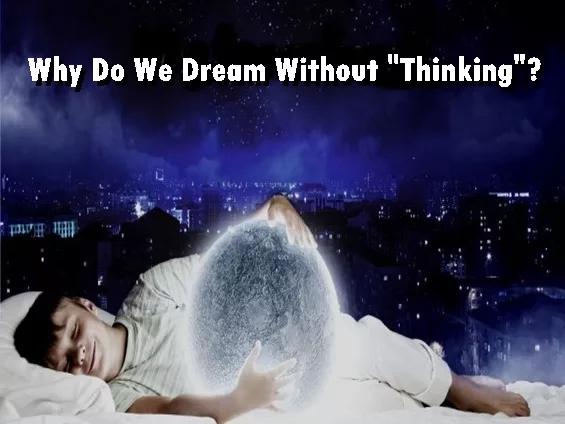Dreams are a fascinating and complex aspect of human experience. They occur during the rapid eye movement (REM) stage of sleep and are characterized by vivid, imaginative experiences that often involve a mix of images, emotions, sensations, and sometimes even narrative storylines. While dreams can sometimes be influenced by thoughts or experiences from our waking life, they often seem to arise without any conscious intention or deliberate thinking. This phenomenon has intrigued researchers, psychologists, and philosophers for centuries, and there are several theories that attempt to explain why we dream even when we’re not actively thinking about the content of our dreams. The following is not overly detailed, but it explains the process to why we dream when we believe we’re not thinking.
Brain Activity During Sleep: One of the main explanations for dreaming is related to the activity of the brain during different sleep stages. While the exact purpose of dreaming is not fully understood, it’s believed that dreaming is linked to the brain’s processing and consolidation of memories, emotions, and experiences. The brain is highly active during REM sleep, and it’s thought that this activity can trigger the creation of dream experiences. One of the biggest influences on dreams is how much or how little you’re sleeping. Being sleep-deprived for a night or two (or more) can make parts of your brain much more active when you finally do slip into REM sleep. You’re likely to have more vivid dreams if you’ve had some restless nights.
Random Activation of Neurons: Another theory suggests that dreams may arise from the random activation of neurons in the brain during sleep. As the brain processes various stimuli and memories, it may create dream scenarios based on seemingly unrelated fragments of information. This could explain why dreams often seem disjointed and bizarre.
Unconscious Thoughts and Emotions: Even when we’re not actively thinking about something during our waking hours, our unconscious mind may still be processing thoughts, emotions, and memories. Dreams may provide an outlet for these unconscious processes to manifest in symbolic and imaginative ways. This is why dreams can sometimes reveal feelings or concerns that we might not be fully aware of while awake.
Emotional Processing: Dreams can serve as a way for the brain to process and make sense of emotions and experiences. Dreams often contain elements from our daily lives, and they can provide a space for the brain to work through challenging emotions or unresolved issues, even if we’re not consciously thinking about them.
Creativity and Problem-Solving: Dreams can also be a source of creativity and problem-solving. Some people have reported experiencing “aha” moments or insights in their dreams that they hadn’t consciously thought of before. This could be because the brain is free to make unique connections and associations during the dreaming process.
Evolutionary Theories: Some theories propose that dreaming may have evolutionary benefits. For instance, dreams could have helped our ancestors practice survival skills or simulate potential scenarios, contributing to their overall adaptability and decision-making skills.
In summary, the question of why we dream even without conscious thinking is still a topic of ongoing research and debate. Dreams serve a variety of functions, from memory consolidation and emotional processing to creative exploration and problem-solving. They offer a window into the complexities of the human mind and our ongoing exploration of the mysteries of sleep and consciousness.











